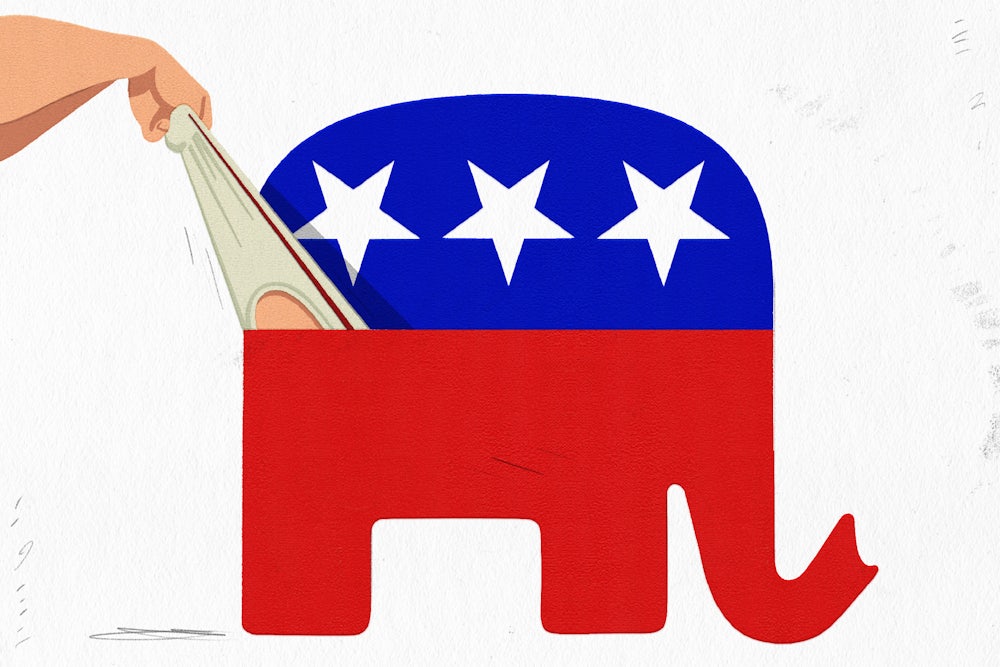Beneath the seemingly hourly chaos of Donald Trump’s second term is a simple dynamic. Republicans, led by tech billionaire Elon Musk and his gang of teen and twentysomething coders, are all action: gutting entire agencies, upending domestic and foreign policy, and threatening much worse. Democrats, meanwhile, have been caught flat-footed by the seemingly endless onslaught of destruction. The party in power never stops moving; the opposition hasn’t figured out how to start.
For most Democratic lawmakers, it’s unclear what resistance even looks like this time around. A prime example is their disjointed, ineffectual, all-around dismal performance at Trump’s unofficial State of the Union on March 4. Many of the women wore hot pink, a coordinated action with no obvious meaning. (“Pink,” one lawmaker explained, “is the color of protest.” Who knew?) Some lawmakers waved small black signs with messages such as “False” and “Musk steals.” Some stood up and silently walked out while Trump was speaking. Some didn’t show up at all.
Only one Democrat was bold enough to actually speak out: Texas Representative Al Green, who was forcibly removed from the chamber after repeatedly shouting, “You have no mandate” at the president as he addressed the nation.
Green’s message hardly differed from the signs his colleagues were tepidly waving. What really mattered was the interruption itself, an act of flagrant disrespect that sought to reflect the seriousness of the moment. Green was doing what you do in an emergency: You freak out.
A day earlier, when House Minority Leader Hakeem Jeffries urged his caucus to exercise restraint and be a “strong, determined, and dignified Democratic presence in the chamber” during Trump’s address, he may have been trying to head off displays such as Green’s. In his view, childish outbursts or anything else that could be described as “Trumpian” would only draw attention away from Trump.
In fact, the less attention paid to Democrats, the better. The smartest thing Democrats could do now, argued Jeffries’s Senate counterpart, Chuck Schumer, was as little as possible. Trump will inevitably, irredeemably mess up, the thinking goes, and, when he does, the Democrats will coast back to power. For an opposition party in the midst of a raging identity crisis, it’s easy to see the appeal of seeking to turn their very powerlessness into an asset. With few tools at their disposal to slow, let alone stop, Trump’s rampage, party leaders have concluded that it’s best to stand back and let it happen. When the public inevitably recoils, voters will rush back to Democrats.
The problem with embracing powerlessness, however, is that you end up looking powerless—and, well, pathetic, which is how Democrats have looked again and again during Trump’s second term in office. As Trump boasted about taking a sledgehammer to federal agencies, Democrats waved their little signs.
When it came time for those same Democrats to try to actually take a stand, they did even worse. Senate Democrats caved on a continuing resolution to keep the government open—but gut several key agencies—without seeking any major concessions. The message is clear, and it isn’t that Trump is a liar or Musk is a crook. It certainly isn’t that Democrats have a plan to win back a majority. It’s that Trump and Musk can do whatever they want—and Democrats have no clue how to stop them.
The March 4 display was a bitter reminder of the failure of Democratic messaging to reflect the anxiety and anger felt by millions across the country. For nearly everybody who isn’t a top Democrat in Washington, this is not a time for respectful disagreement. It’s time for outrage. “We’ve gotta get meaner, we’ve gotta get grittier,” Suzanne Lambert, a Washington-based comedian, told The New Republic. “We have to stop being afraid, and we have to stop putting political correctness and diplomacy above the urgency of action that’s needed at this current time, and above what constituents want to hear from politicians.”
Lambert, who is in her early thirties, went viral shortly after the election, when she made a TikTok video urging the “Regina George Liberals” to step up to the plate. (For those too young or too old to remember, Regina George is the main antagonist in the 2004 movie Mean Girls, and a master of petty cruelty.) Lambert has since popularized the “Republican makeup” trend, crafting videos that skewer both MAGA women’s makeup and their political beliefs.
She’s not the only one who wants Democrats to hit back harder. A devastating mid-February survey from Blueprint, a liberal research firm, found that only 10 percent of respondents thought the Democratic Party had a good strategy for combating Trump. A CNN poll published later that month found that almost three-quarters of Democrats and left-leaning independents think Democratic lawmakers aren’t doing enough to stand up to Trump.
Lambert’s approach is not for everyone. “There is a difference between being tough and being mean,” longtime Democratic strategist David Axelrod told The Washington Post when asked about her. “If you want to win elections, better to be the first than the second. If you want to get clicks and amuse your base, [go] with number two.”
Lambert disagrees. If she doesn’t stoop to their level, she said, how are her opponents going to hear her? “I mean, at this point, I’m crouching,” she quipped. “My quads are burning.” And by voting for candidates who want to make the world a better place, she added, she’s already done the “better thing.”
She is far from alone in embracing a meaner approach, as many people are taking it upon themselves to personally bully Republicans currently pushing Trump and Musk’s agenda.
Nothing unites people like hating the same thing, and meanness can create a bond between politicians and their constituents. “It makes you feel like your elected official is on your side, like they are fighting with you, I think especially at a moment when they don’t have a ton of legislative power,” said Amanda Litman, the co-founder and president of Run for Something, a progressive organization focused on recruiting and supporting young candidates to run for downballot office. “Emotional signaling is really important right now.”
We’ve seen this approach work before: One of the most energizing moments of Kamala Harris’s 2024 campaign was when she embraced calling Trump “weird” and let Minnesota Governor Tim Walz meme his way onto the ticket with her.
It was a simple dig, but it worked like no other Democratic insult has before or since. “If you want people to pay attention to what you are doing, you need to make it high-low conflict,” Litman said. “That doesn’t mean it needs to be silly or lacking in substance, but it needs to be interesting—and petty meanness is interesting.”
By this reasoning, the time for Michelle Obama’s “When they go low, we go high” approach has clearly passed. The party’s insistence on playing by the old rules won’t get them anywhere with people who have put the rule book through the shredder. And as Democrats cling to respectability, they lose easy battles.
After all, in politics, bullying often serves as a crucial accountability mechanism. When California Republican Representative Michelle Steel tried last year to hide her history of support for criminalizing in vitro fertilization in the wake of an Alabama state Supreme Court decision that did exactly that, she was relentlessly hounded online for months before losing her reelection bid to Democrat Derek Tran.
Here’s the thing: This country loves spite. More people tuned in to watch Kendrick Lamar perform his Drake diss track “Not Like Us” at the Super Bowl LIX halftime show than watched the actual game. Hardly anyone remembers what Trump said during his first term State of the Union addresses, but everyone remembers when Nancy Pelosi ripped up his speech in 2019 or clapped in his face a year later.
Petty gestures don’t have to be empty. They can help oppose Republican spending bills and future Cabinet nominations; they can assist other efforts, futile or not, to gum up the works. And with Democrats in the minority in both houses of Congress, attention-grabbing acts of disrespect are one of the few, powerful resistance tools at their disposal.
Representative Robert Garcia made that clear in February when he announced in the first DOGE subcommittee hearing that he would introduce a “dick pic.”
“This,” he said, holding up a massive photo of Musk, “is President Elon Musk.” The move was crass, but it was funny. It called attention to the enormous power Musk is currently wielding, and it created a virtuous cycle. The clip was aired repeatedly on cable news and led to Garcia appearing on a number of television shows where he continued to batter Musk.
Similarly, Senator Cory Booker captured national attention on March 31 when he embarked on a marathon filibuster speech to protest Trump’s policies. Booker spoke for more than 25 hours, breaking the record for the longest speech delivered in the chamber, which was previously set by Strom Thurmond—who was attempting to block a civil rights bill—in 1957. More than 350 million people liked the livestream of Booker’s speech, and afterward, he woke up April 2 to widespread praise.
Which brings us back to Al Green, whose outburst may soon be seen as a pivotal moment in the second Trump administration. Within hours of the president’s joint address to Congress, the Democrats’ feeble use of auction paddle signs had been all but forgotten. Green’s outburst, however, was still national news—in large part because Republicans were still fuming over it. Barely more than 24 hours after the speech, Green was censured by his colleagues in the House of Representatives.
Ten Democrats voted with Republicans, some of whom have expressed interest in stripping him of his committee assignments. Democratic Party leaders, meanwhile, are still trying to crack down on even bland forms of dissent—a clear sign of how badly the party is floundering.
“We are helping them understand why their strategy is a bad idea,” one source told Axios about conversations with their colleagues who interrupted Trump’s speech. Another House Democrat was less generous, sniping, “Would they have done that to [Nancy Pelosi]? You know the answer: Never. So you’ve got to put the hammer down.”
One thing is for sure: Pelosi would have put up a much better fight than what we’ve seen since Trump’s inauguration. A petty queen in her own right, within hours of regaining the House speakership in 2019, Pelosi promptly shot down Trump’s dream of a wall along the southern border—and continued openly antagonizing him through the rest of his presidency. Pelosi is clearly chafing at her colleagues’ behavior now. She urged Senate Democrats to oppose the appropriations bill and expressed frustration on March 18 with Schumer specifically. “I myself don’t give away anything for nothing,” she told a news conference. It was a not-so-subtle reminder that, only a few years ago, mounting a resistance to Donald Trump was not something Democratic leaders shied away from.
Indeed, the electoral success Democrats saw between 2018 and 2020 could be attributed to the strength of that resistance. Pelosi hewed closer to more rigid, centrist approaches to legislation, but her outwardly aggressive behavior toward Trump personally helped galvanize the Democratic base and gave permission to be just as loud and aggressive in their resistance (even if that resistance sometimes went further than Pelosi liked). In four years, it resulted in historic victory: Trump became the first president since 1932 to lose the House, the Senate, and reelection in his first four years in office.
This time around, voters are exhausted. And with Democrats largely rolling over, it’s hard to see a light at the end of the tunnel. “We have spent the last eight years ... talking about how Donald Trump is a threat to democracy, and now that he’s in power again, we are seeing that was true,” Litman said. “He is, in fact, a threat to democracy, and we want our leaders to act like it.” For Lambert, acting like it means no longer playing it “so, so, so, so safe,” and being “willing to take some risks.”
If they don’t, Democrats run the risk of never reclaiming power. As Trump barrels toward the 100-day mark of his second term, he remains stubbornly popular—albeit with an approval rating hovering in the upper 40s. The Democratic brand, meanwhile, is in the dumpster: Recent polling from NBC and CNN found the party had record-low favorability numbers. This huge problem will only get worse if Democrats keep meekly standing by while Trump and Musk rampage through every federal department. A failure to act at this moment won’t send voters running back to the Democrats. It will send them to the next strongman and his fanciful promises—or just to this one.






